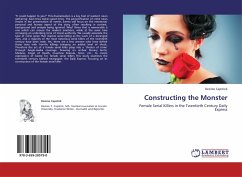
Constructing the Monster
Female Serial Killers in the Twentieth Century Daily Express
Versandkostenfrei!
Versandfertig in 6-10 Tagen
32,99 €
inkl. MwSt.

PAYBACK Punkte
16 °P sammeln!
It could happen to you! This dramatization is a key trait of western news gathering- bad news makes good news. The personification of crime news results in the presentation of events. Events will focus on the emotional, personal and human aspect of the story, often resulting in context, background and analysis being ignored. Why? News that is memorable is one which can arouse the readers' emotions, while at the same time conveying an underlying tone of moral authority. We usually associate the type of crime spree that inspires serial killing as the work of a deranged man, and a majority of the...
It could happen to you! This dramatization is a key trait of western news gathering- bad news makes good news. The personification of crime news results in the presentation of events. Events will focus on the emotional, personal and human aspect of the story, often resulting in context, background and analysis being ignored. Why? News that is memorable is one which can arouse the readers' emotions, while at the same time conveying an underlying tone of moral authority. We usually associate the type of crime spree that inspires serial killing as the work of a deranged man, and a majority of the most notorious serial killers of the twentieth century have been male. Yet, there are a few women who have defied those stats with horrific killings bringing an added level of shock. Therefore the act of a female serial killer plays into a theater of crime through Anglo-media coverage. Drawing on archaic literary terms: Medusa, Angel of Death, Countess Dracula, Siren, etc., to create expressions of blame for female serial killers. This study examines the twentieth century tabloid newspaper, the Daily Express. Focusing on its construction of the female serial killer.












